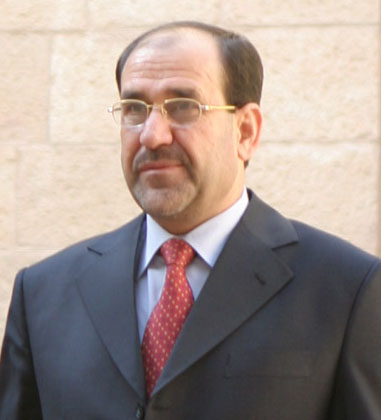
BAGHDAD — Iraq’s Shiite prime minister on Wednesday called on his nation’s political blocs to close ranks in the face of a growing threat by Sunni militants who have blitzed through the country’s west and north, but he gave no concrete promise of greater political inclusiveness for minority Sunnis.
U.S. officials have pressed for the next Iraqi government to be more inclusive, seeking to draw Sunni support away from militants who this month swept over much of the country’s north and west.
In his weekly address to the nation, Nouri al-Maliki gave only a vague call for “all political forces to reconcile” with the principles of Iraq’s constitutional democracy.
He rejected forming a “national salvation” government, which he said would go against the results of parliamentary elections held on April 30. Al-Maliki’s coalition, the State of the Law, won the most seats in that vote — 92 of the 328-seat chamber. In office since 2006, al-Maliki needs the support of a simple majority in the chamber to hold on to the job.
“We desperately need to take a comprehensive national stand to defeat terrorism, which is seeking to destroy our gains of democracy and freedom, set our differences aside and join efforts,” said al-Maliki. “The danger facing Iraq requires all political groups to reconcile on the basis and principles of our constitutional democracy.”
Al-Maliki’s government is struggling to repel advances led by militants of the Islamic State of Iraq and the Levant, a well-trained and mobile force thought to have some 10,000 fighters and allies inside Iraq.
Also Wednesday, Sunni militants launched a dawn raid on a key Iraqi oil refinery they have been trying to take for days but were repelled by security forces, said Col. Ali al-Quraishi, the commander of the Iraqi forces on the scene.
Meanwhile, dozens of newly arrived U.S. military advisers and special operations forces began assessing the Iraqi forces in an effort to strengthen Baghdad’s ability to confront the insurgency.
President Barack Obama last week announced he would send as many as 300 advisers into Iraq to advise Iraqi security forces.
U.S. Navy Rear Adm. John Kirby said the American advisers already in Baghdad included two teams of special forces and about 90 advisers, intelligence analysts, commandos and support personnel needed to set up a joint operations center in the Iraqi capital. Another four teams of special forces would arrive in the next few days, Kirby said.
Iraqi officials have said the U.S. advisers were expected to focus on the better units the Americans had closely worked with before pulling out. Combined with approximately 360 other U.S. forces in and around the American Embassy in Baghdad to perform security, they would bring the total U.S military presence in Iraq to about 560.
In the face of militant advances that have virtually erased Iraq’s western border with Syria and captured territory on the frontier with Jordan, al-Maliki’s focus has been the defense of Baghdad, a majority Shiite city of 7 million fraught with growing tension. The city’s Shiites fear they could be massacred and the revered al-Kazimiyah shrine destroyed if Islamic State fighters capture Baghdad. Sunni residents also fear the extremists, as well as Shiite militiamen in the city, who they worry could turn against them.
The militants have vowed to march to Baghdad and the holy Shiite cities of Najaf and Karbala, a threat that prompted the nation’s top Shiite cleric, Grand Ayatollah Ali al-Sistani, to issue an urgent call to arms that has resonated with young Shiite men.